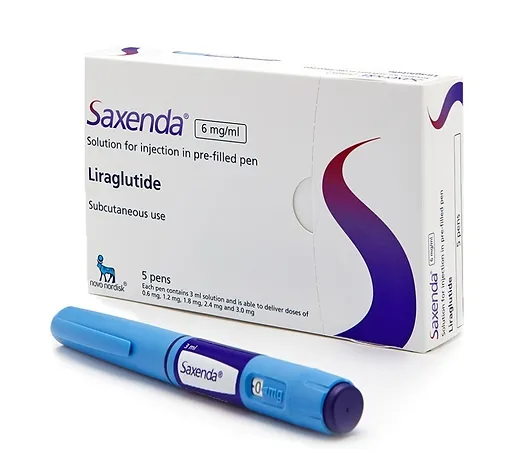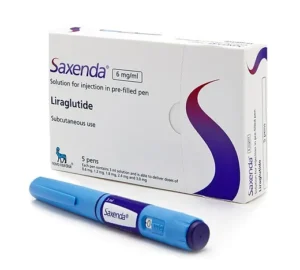
Liraglutide: A GLP-1 Receptor Agonist
Liraglutide is a medication used primarily for managing type 2 diabetes and obesity. It belongs to a class of drugs known as GLP-1 (glucagon-like peptide-1) receptor agonists, which play a crucial role in regulating blood glucose levels and promoting weight loss.
Mechanism of Action
Liraglutide mimics the activity of the natural hormone GLP-1, which is secreted by the intestines after eating. It activates GLP-1 receptors in the pancreas, stimulating insulin release in response to elevated blood glucose levels. Additionally, it inhibits glucagon release, which helps reduce liver glucose production, and delays gastric emptying, contributing to feelings of fullness.
Uses of Liraglutide
- Type 2 Diabetes:
Liraglutide helps control blood glucose levels when used alongside diet and exercise.
- Obesity Management:
It is also used for weight management in patients with a BMI ≥30, or ≥27 with related health conditions like hypertension or type 2 diabetes.
- Cardiovascular Benefits: Liraglutide can reduce the incidence of major cardiovascular events, including heart attack and stroke, in people with type 2 diabetes.
Dosage Formulations
Liraglutide is available in several forms, primarily as an injectable. The specific dose, strength, and formulation depend on the condition of the disease.
| Brand Name | Active Ingredient | Dosage Form | Strength | Indications | Frequency |
| Victoza | Liraglutide | Subcutaneous Injection | 0.6, 1.2, 1.8 mg | Type 2 diabetes | Daily |
| Saxenda | Liraglutide | Subcutaneous Injection | 0.6, 1.2, 1.8 mg | Obesity management | Daily |
How to Administer Liraglutide
Its administration is through a subcutaneous injection, typically in the abdomen, thigh, or upper arm area. It is injected once daily, at any time of day, with or without food.
Side Effects of Liraglutide
Like all medications, it can cause side effects. Common side effects include:
- Nausea
- Vomiting
- Diarrhea
- Headache
- Decreased appetite
Serious side effects may include:
- Pancreatitis (inflammation of the pancreas)
- Thyroid tumors (in animal studies, risk is unclear in humans)
- Acute kidney injury
- Gallbladder disease
Contraindications
Liraglutide should not be used in patients with:
- A history of medullary thyroid carcinoma in a person or other family members(MTC)
- Multiple endocrine neoplasia syndrome type 2 (MEN 2)
- History of pancreatitis
- Severe gastrointestinal disease (e.g., gastroparesis)
Drug Interactions of Liraglutide
It may interact with certain medications, including:
- Insulin: May increase the risk of low blood sugar (hypoglycemia) when combined with insulin or other antidiabetic drugs.
- Oral contraceptives: The delayed gastric emptying caused by liraglutide may reduce the absorption of oral medications, including birth control pills.
- Warfarin: There may be an interaction with anticoagulants like warfarin, increasing the risk of bleeding.
Precautions
- Monitor blood sugar levels regularly, especially when starting or adjusting the dose.
- Use with special care and monitoring in patients with a history of kidney or liver problems.
- Liraglutide should not be used during pregnancy or breastfeeding unless deemed absolutely necessary by a healthcare provider.
Conclusion
Liraglutide is an effective treatment for type 2 diabetes and obesity, offering multiple benefits, including improved blood glucose control, weight loss, and potential cardiovascular protection. While generally well-tolerated, it requires careful monitoring for side effects, and patients should be aware of its contraindications and drug interactions.
Always inform a healthcare professional before starting or adjusting the dose of any medication.
